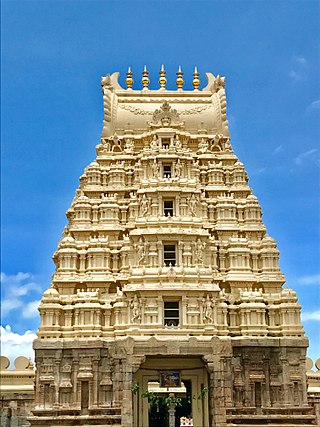
Srirangapatna is a town and headquarters of one of the seven Taluks of Mandya district, in the Indian State of Karnataka. It gets its name from the Ranganthaswamy temple consecrated around 984 CE. Later, under the British rule, the city was renamed to Seringapatnam. Located near the city of Mandya, it is of religious, cultural and historic importance.

Gezira, also spelt Al Jazirah, Al Jazeera and Al Jazira, is one of the 18 states of Sudan. The state lies between the Blue Nile and the White Nile in the east-central region of the country. The state has a population of 5,096,920 as of 2018, and an area of 27,549 km2.

Anglo-Egyptian Sudan was a condominium of the United Kingdom and Egypt between 1899 and 1956, corresponding mostly to the territory of present-day South Sudan and Sudan. Legally, sovereignty and administration were shared between both Egypt and the United Kingdom, but in practice the structure of the condominium ensured effective British control over Sudan, with Egypt having limited local power and influence. In the meantime, Egypt itself fell under increasing British influence. Following the Egyptian Revolution of 1952, Egypt pushed for an end to the condominium, and the independence of Sudan. By agreement between Egypt and the United Kingdom in 1953, Sudan was granted independence as the Republic of the Sudan on 1 January 1956. In 2011, the south of Sudan itself became independent as the Republic of South Sudan.

Ali Osman Mohammed Taha is a Sudanese politician who was First Vice President of Sudan from July 2011 to December 2013. Previously he was Minister of Foreign Affairs from 1993 to 1995, First Vice President from 1995 to January 2005, and Second Vice President from August 2005 to July 2011. He is a member of the National Congress Party.

Kassala is the capital of the state of Kassala in eastern Sudan. In 2002 its population was recorded to be 957,000. Built on the banks of the Gash River, it is a market town and is famous for its fruit gardens. Many of its inhabitants are from the Hadendawa sub-tribe of the Beja ethnic group.

Wad Madani, Wad Medani or Madani is the capital of the Al Jazirah state in east-central Sudan. Wad Madani lies on the west bank of the Blue Nile, nearly 85 miles (136 km) southeast of Khartoum. It is linked by rail to Khartoum and is the center of a cotton-growing region. The city is also the center of local trade in wheat, peanuts, barley, and livestock. It is also headquarters of the Irrigation Service. In 2008, its population was 345,290. It is the home of the Al Jazirah University, the second biggest public university in Sudan. It also has Wad Medani Ahlia University, a private university.

Shendi or Shandi is a small city in northern Sudan, situated on the southeastern bank of the Nile River 150 km northeast of Khartoum. Shandi is also about 45 km southwest of the ancient city of Meroë. Located in the River Nile state, Shandi is the center of the Ja'alin tribe and an important historic trading center. Its principal suburb on the west bank is Matamma. A major traditional trade route across the Bayuda Desert connects Matamma to Merowe and Napata, 250 km to the northwest. The city is the historical capital of the powerful Sudanese Arab Ja'alin tribe whom most of its denizens belong to. The village of Hosh Bannaga, hometown of former President Omar al-Bashir, is located on the outskirts of the city.
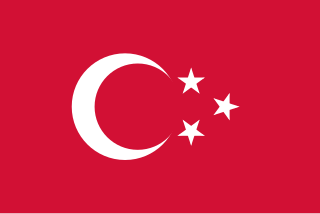
Turco-Egyptian Sudan, also known as Turkiyya or Turkish Sudan, describes the rule of the Eyalet and later Khedivate of Egypt over what is now Sudan and South Sudan. It lasted from 1820, when Muhammad Ali Pasha started his conquest of Sudan, to the fall of Khartoum in 1885 to Muhammad Ahmad, the self-proclaimed Mahdi.
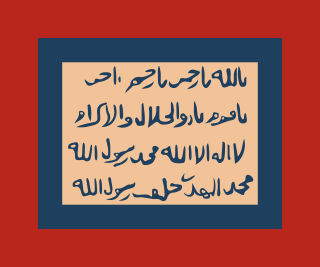
The Mahdist State, also known as Mahdist Sudan or the Sudanese Mahdiyya, was a state based on a religious and political movement launched in 1881 by Muhammad Ahmad bin Abdullah against the Khedivate of Egypt, which had ruled Sudan since 1821. After four years of struggle, the Mahdist rebels overthrew the Ottoman-Egyptian administration and established their own "Islamic and national" government with its capital in Omdurman. Thus, from 1885 the Mahdist government maintained sovereignty and control over the Sudanese territories until its existence was terminated by the Anglo-Egyptian forces in 1898.

The historyofAnglo-Egyptian Sudan refers to the history of Sudan from 1899 to 1955.
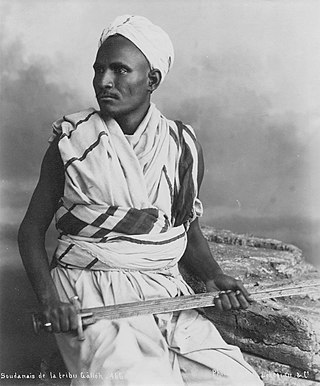
The Ja'alin, Ja'aliya, Ja'aliyin or Ja'al are a tribal confederation and an Arab or Arabised Nubian tribe in Sudan. The Ja'alin constitute a large portion of the Sudanese Arabs and are one of the three prominent Sudanese Arab tribes in northern Sudan - the others being the Shaigiya and Danagla. They trace their origin to Ibrahim Ja'al, an Abbasid noble, whose clan originally hailed from the Hejaz in the Arabian Peninsula and married into the local Nubian population. Ja'al was a descendant of al-Abbas, an uncle of Muhammad. The Ja'alin formerly occupied the country on both banks of the Nile from Khartoum to Abu Hamad. According to a source, the tribe allegedly once spoke a now extinct dialect of Nubian as late as the nineteenth century. Many Sudanese politicians have come from the Ja'alin tribal coalition.
The Mahas are a sub-group of the Nubian people located in Southern Egypt and Northern Sudan along the banks of the Nile.

The Butana, historically called the Island of Meroë, is the region between the Atbara and the Nile in the Sudan. South of Khartoum it is bordered by the Blue Nile and in the east by Lake Tana in Ethiopia. It should not be confused with the Gezira, the region west of the Blue Nile and east of the White Nile.
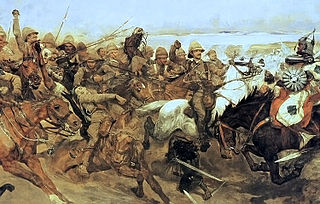
The Mahdist War was a war between the Mahdist Sudanese, led by Muhammad Ahmad bin Abdullah, who had proclaimed himself the "Mahdi" of Islam, and the forces of the Khedivate of Egypt, initially, and later the forces of Britain. Eighteen years of war resulted in the creation of Anglo-Egyptian Sudan (1899–1956), a de jure condominium of the British Empire, and the Kingdom of Egypt, in which Britain had de facto control over Sudan. The Sudanese launched several unsuccessful invasions of their neighbours, expanding the scale of the conflict to include not only Britain and Egypt but also the Italian Empire, the Congo Free State and the Ethiopian Empire.
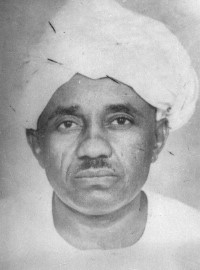
Mahmoud Mohammed Taha, also known as Ustaz Mahmoud Mohammed Taha, was a Sudanese religious thinker, leader, and trained engineer. He developed what he called the "Second Message of Islam", which postulated that the verses of the Qur'an revealed in Medina were appropriate in their time as the basis of Islamic law, (Sharia), but that the verses revealed in Mecca represented the ideal and universal religion, which would be revived when humanity had reached a stage of development capable of implementing them, ushering in a renewed era of Islam based on the principles of freedom and equality. He was executed for apostasy for his religious preaching at the age of 76 by the regime of Gaafar Nimeiry.

The Liberal Party is a social liberal political party in Sudan.

The Battle of Abu Hamed occurred on 7 August 1897 between a flying column of Anglo-Egyptian soldiers under Major-General Sir Archibald Hunter and a garrison of Mahdist rebels led by Mohammed Zain. The battle was a victory for the Anglo-Egyptian forces, and secured for the British the strategically vital town of Abu Hamed, which was the terminus for trade and transportation across the Nubian Desert.

The Turco-Egyptian conquest of Sudan was a major military and technical feat. Fewer than 10,000 men set off from Egypt, but, with some local assistance, they were able to penetrate 1,500 km up the Nile River to the frontiers of Ethiopia, giving Egypt an empire as large as Western Europe.
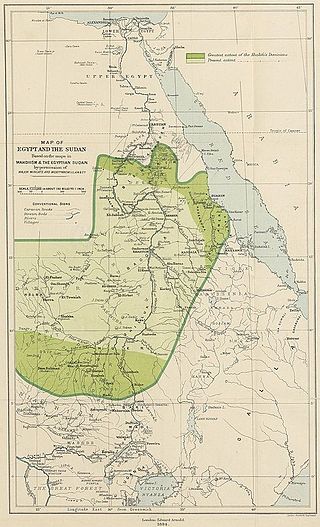
The Anglo-Egyptian conquest of Sudan in 1896–1899 was a reconquest of territory lost by the Khedives of Egypt in 1884–1885 during the Mahdist War. The British had failed to organise an orderly withdrawal of the Egyptian Army from Sudan, and the defeat at Khartoum left only Suakin and Equatoria under Egyptian control after 1885. The conquest of 1896–1899 defeated and destroyed the Mahdist State and re-established Anglo-Egyptian rule, which remained until Sudan became independent in 1956.
Native administration is the formal institution of traditional systems of governance used in Sudan. This form of administration is primarily used in rural areas, especially among nomadic or semi-nomadic people. Through this system, various formal powers are given to traditional leaders, complementing existing informal influence among their communities, and sometimes relatively large economic power.

















